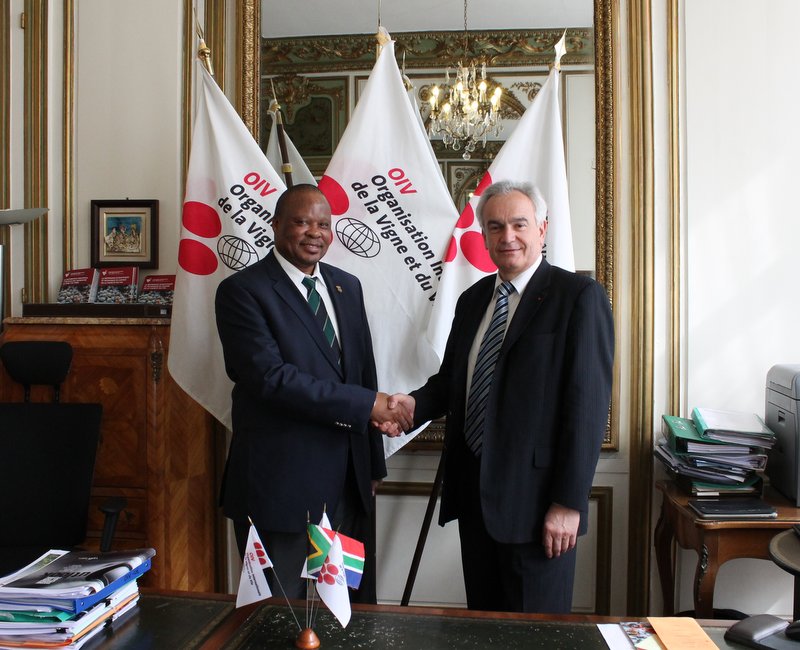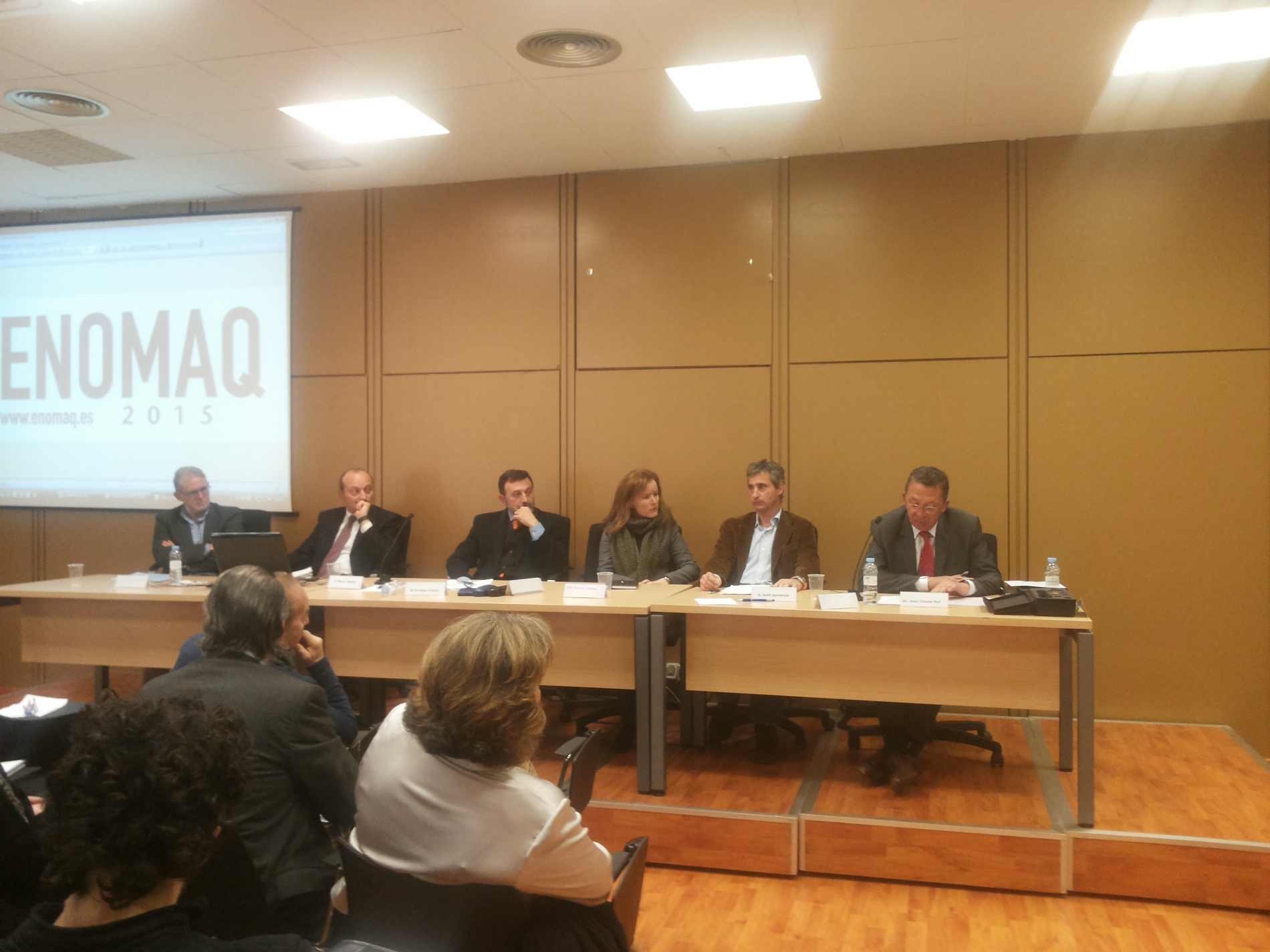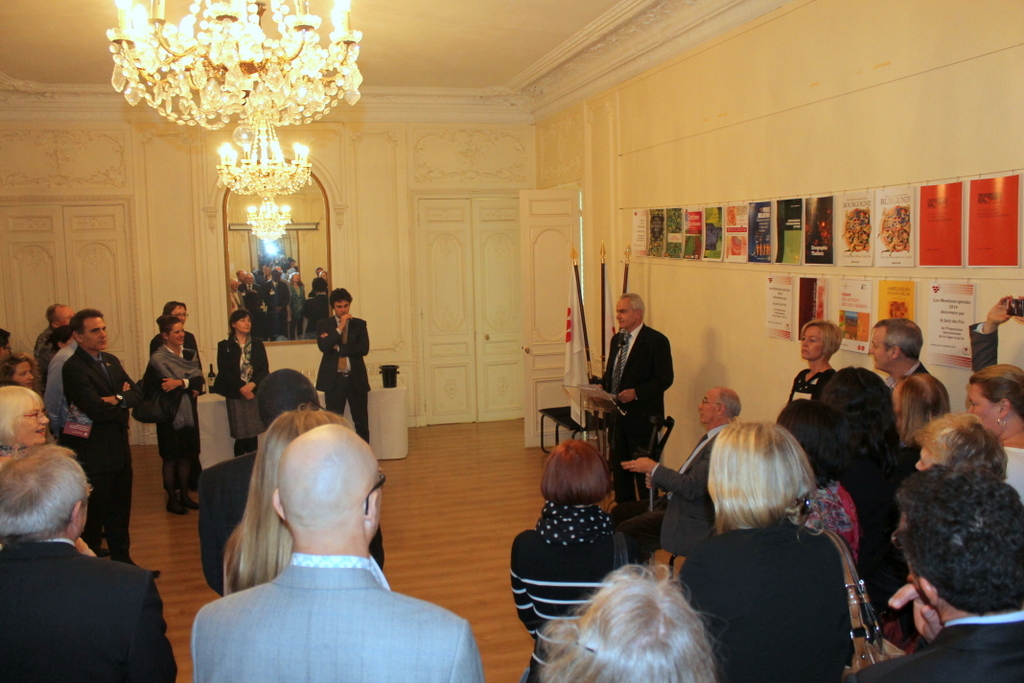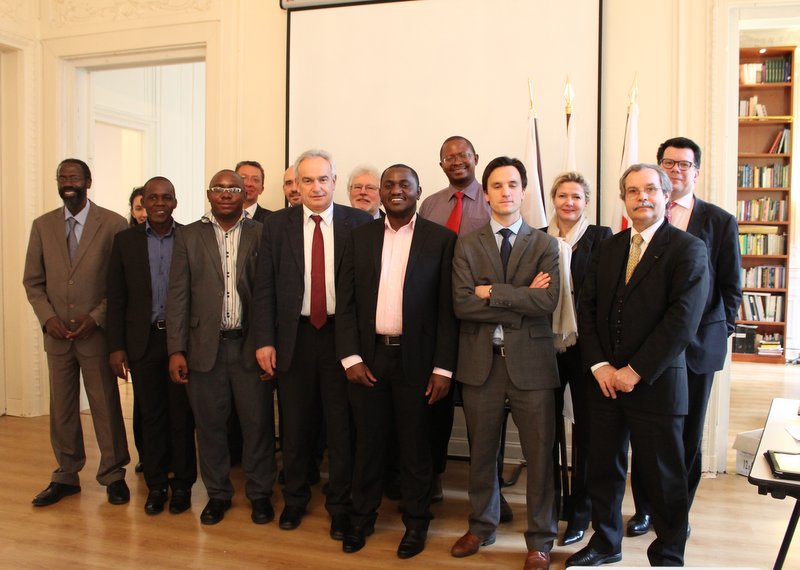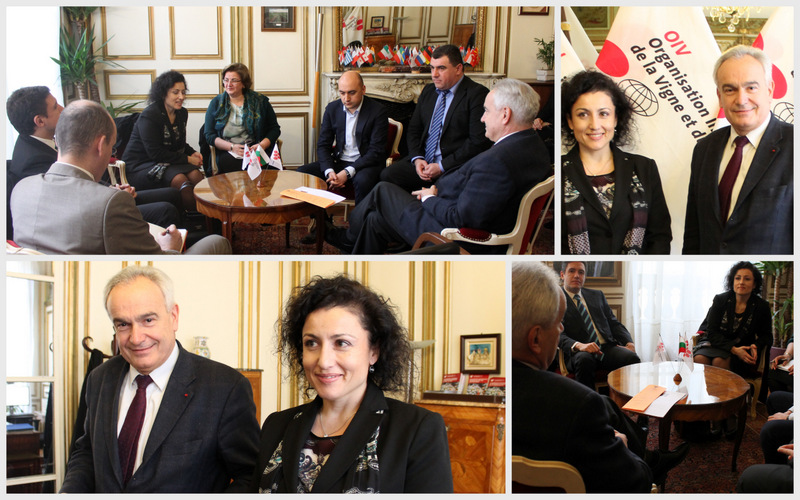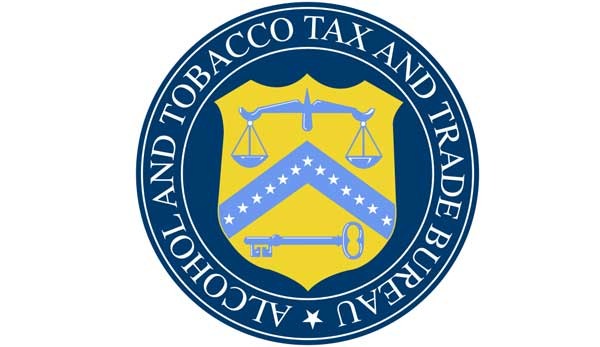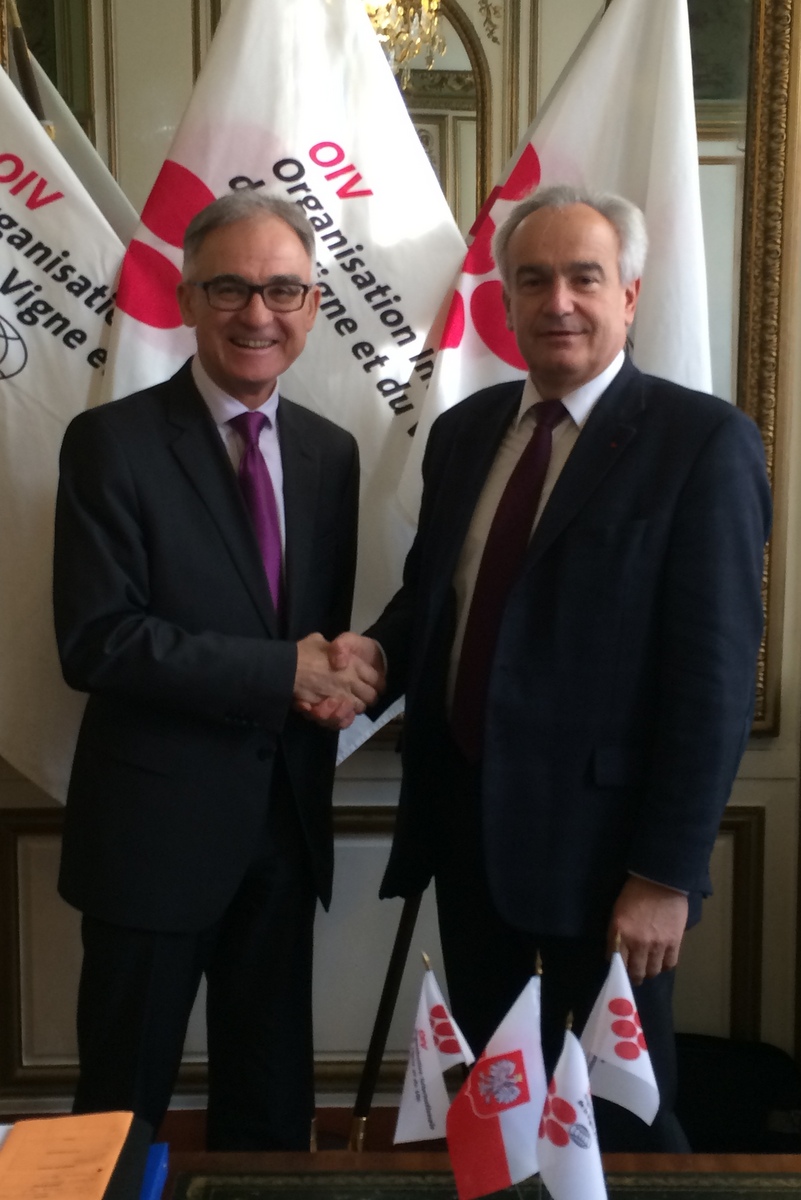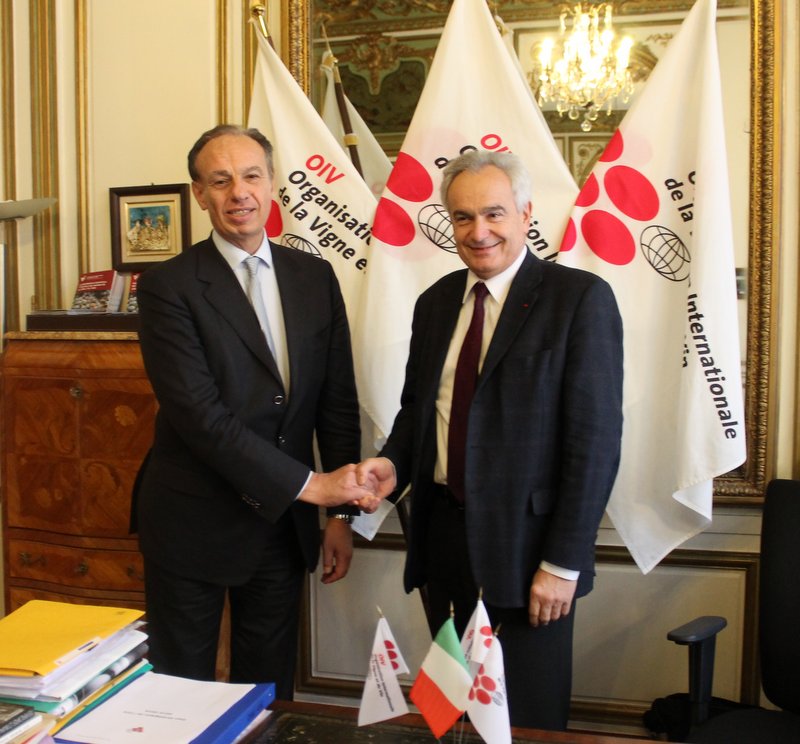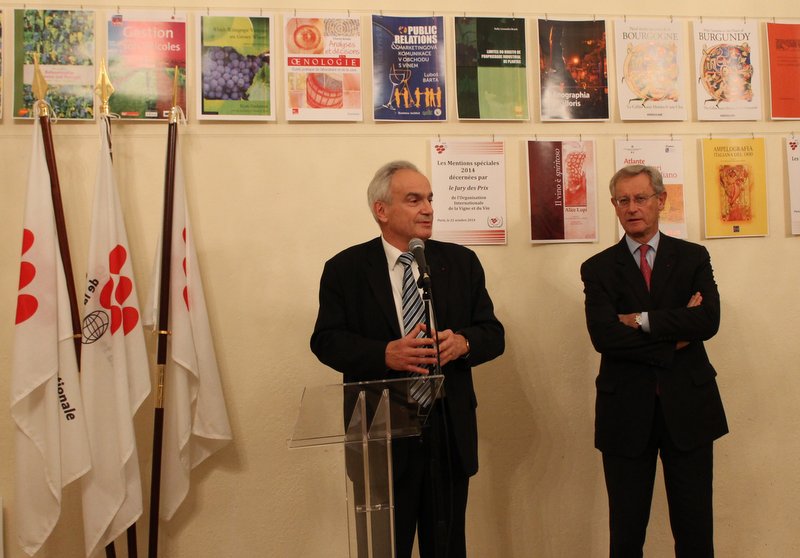24 Mar 2015
During this meeting, Mr Jean-Marie Aurand recalled the missions of the OIV and elaborated on the challenges faced by the vitivinicultural field as they are defined in the 2015-2019 OIV Strategic Plan. He also emphasised the involvement of the South African experts within the OIV, expressing the wish that this may be expanded into the table grape sector, where the expertise of South Africa is recognised in international markets. H.E. Mr Rapulane Molekane stressed the importance of consensus regarding the methods by which OIV standards and recommendations are drawn up. He also expressed his satisfaction with the cooperation between his country and the OIV, adding that he would like to see strengthened collaboration where issues related to water management are concerned.
16 Mar 2015
This conference was placed under the patronage of the International Organisation of Vine and Wine with Dr Jean-Claude Ruf, Scientific Coordinator of the OIV, acting as president of the conference, accompanied by Mr Salvador Manjón, Director of SEVI.A large number of participants from the vitivinicultural sector attended the conference.The conclusions from the day are available here Dr Jean-Claude Ruf (pictured right) during his speech
10 Mar 2015
After meeting with the President of the Codex Alimentarius Commission, Ms Awilo Ochieng Pernet, Mr Aurand presented the objectives, missions and actions of the OIV, emphasising the common sectors of activity (additives, contaminants, methods of analysis, grapes, etc.) to which the OIV can and should contribute its international expertise to ensure that the specificities of the vitivinicultural sector are addressed within the Codex. In the presence of Professor Michel Thibier, President of the Committee on General Principles, and of Mr Tom Heilandt, Secretary of the Codex Alimentarius, the Director General of the OIV expressed his satisfaction with this meeting, which enabled many government representatives from non-Member States of the OIV – particularly in Africa and Asia – to discover the OIV's activities and discuss work of common interest that could be developed between the two organisations. Mr Aurand with Ms Ochieng Pernet and Mr Heilandt
05 Mar 2015
The Director General of the OIV presented statistical trends and the way in which the Organisation functions before going on to describe its activities with regard to vitivinicultural standardisation.Representatives from national standardisation bodies and professionals in alcoholic beverages raised many issues regarding the drafting processes and the relationships with the Codex Alimentarius standards. Mr Alligator Makori, who runs the standardisation committee, pointed out the growing interest in the wine sector, which has seen an increase in consumption. Following a presentation of the product definitions and analytical standards by Dr Jean-Claude Ruf, OIV Scientific Coordinator, a discussion took place on the draft East African standards relating to still, sparkling and fortified wines.Mr Aurand expressed his satisfaction with the wealth of discussions and interest expressed in the sector by the senior East African figures, whose countries have experienced a rise in wine consumption. This development will result in an increase in trade and thus the need to ensure the safety of the wine supply through recognised international standards.* The East African Community is a regional intergovernmental organisation that brings together Burundi, Kenya, Rwanda, Tanzania and Uganda.
19 Feb 2015
Mr Jean-Marie Aurand, accompanied by Dr Jean-Claude Ruf (Scientific Coordinator of the OIV), presented statistics relating to production, trade and consumption of wine around the world and the latest developments as part of the WHO expert meeting dedicated to evaluating global alcoholic beverage consumption.This meeting falls within the framework of the collaboration between the WHO and the OIV, which was initiated several years ago. Indeed, the WHO uses OIV data to a significant extent as a basis for the evaluation of the production and consumption of alcohol of vitivinicultural origin in various countries around the world.
19 Feb 2015
During this discussion, the Director General highlighted the involvement of the Executive Agency on Vine and Wine, represented by its Director, Mr Krasimir Koev, and made reference to various avenues that would enable Bulgaria to position itself as one of the leading viticultural countries in the Black Sea area. Among the activities envisaged, two areas could be given priority, namely the organisation of a regional scientific and technical forum in Bulgaria and the involvement of the country's university and professional sector in the OIV's Master's programme (the MSc OIV in Wine Management).In addition, H.E. Mr Anguel Tcholakov, Ambassador Extraordinary and Plenipotentiary of Bulgaria in France, supported the idea of organising a presentation of his country's wines at the OIV headquarters during the exhibition of Thracian treasures from Bulgaria, a cultural event that is to be held at the Louvre in spring 2015.The Minister for Agriculture also stressed the importance she attached to strengthening the contribution of Bulgarian expertise within the OIV as part of the rural development programme, certain aspects of which particularly affect native table grapes and wine grapes.
12 Feb 2015
The Alcohol and Tobacco Tax and Trade Bureau (TTB) is proposing to amend its regulations to permit the use of American viticultural area (AVA) names as appellations of origin (AO) on labels for wines that would otherwise qualify for the use of the AVA name, except that the wines have been fully finished in a State adjacent to the State in which the viticultural area is located, rather than the State in which the labeled viticultural area is located.The proposal would provide greater flexibility in wine production and labeling while still ensuring that consumers are provided with adequate information as to the identity of the wines they purchase.TTB permits the use of viticultural area names as appellations of origin on wine labels, so that vintners may better describe the origin of their wines and consumers may better identify the wines they may purchase.Download the proposal
03 Feb 2015
Mainly based on hybrids such as Solaris, Hibernal or Maréchal Foch, viticulture is growing in the region of Zielona Góra, as well as in the west of the country, in Wroc?aw in the south-west, in Krakow in the south, in the region of Podkarpacie and in Kazimierz Dolny in the south-east. In addition, consumption has also increased over the past few years, going from 1.4 litres to 2.4 per capita.After recalling the objectives and missions of the OIV, Mr Jean-Marie Aurand stressed the benefits of joining the large OIV family for Poland, both as a producing country with specific climate conditions and as a consuming country increasingly interested in wine culture.The Polish Ambassador indicated that he would engage in the necessary discussions with the Polish Minister for Agriculture so that the possibility of OIV membership can be considered as soon as possible.
27 Jan 2015
Mr Aurand took this opportunity to praise the excellent relationship between the Italian authorities and the OIV and the very valuable contribution made by experts from the Italian delegation in the OIV's scientific and technical groups, highlighting the fact that one of the four OIV commissions, the commission on economic and legal issues, is currently presided over by Prof. Eugenio Pomarici. The Director General of the OIV also paid tribute to the contribution made by his predecessor, Federico Castellucci, to the Organisation, and shared the OIV's strategic axes for the next five years with the Italian Ambassador. H.E. Mr Checchia underlined the importance of the vitivinicultural sector for Italy and pledged his country's support in implementing these strategic objectives, which it played a key role in developing.
22 Jan 2015
Mr Aurand summarised the events of 2014, his first year in office, highlighting the fact that "the OIV family has expanded, with the addition of our newest Member State, Armenia, which joined the organisation after Azerbaijan in 2013 and India in 2012. This growth shows that our Organisation is attractive and has a great image". Expressing his desire to negotiate more new memberships in 2015, the Director General reminded attendees that "our Member States currently represent almost 85% of global wine production and 80% of global wine consumption". Jean-Marie Aurand then paid tribute to the success of the 37th World Congress of Vine and Wine, which took place in November 2014, in Mendoza, Argentina, calling it "a memorable congress, which boasted more than 1000 participants and in which more than 500 scientific papers were presented". The General Assembly of the OIV also formally adopted the 2015-2019 Strategic Plan, the Organisation's roadmap for the next five years. "This plan takes into consideration major developments in the vitivinicultural sector: an increasingly globalised and internationalised market (2 out of every 5 bottles of wine consumed globally are imported), growing competition and new expectations from consumers and the general public", the Director General explained.In this context, "it is important to identify good practices and rules that preserve the stability and quality of products in order to ensure fair trade and to respond to consumer expectations in terms of product quality, health protection and transparency. This strategic plan also tackles new issues such as the impact of climate change and the promotion of sustainable viticulture" [2015-2019 Strategic Plan].Another highlight identified by Jean-Marie Aurand concerned "efforts to improve and modernize the operation of the Organization. For example, OIV experts can now, for the first time, disseminate their presentations and studies via a scientific publisher, [OIV-EDP Sciences], while communications and presentations are being enhanced by the use of statistical data from the vitivinicultural sector". The Director General of the OIV also reminded attendees that 2015 will see the election of a new president of the Organization, as well as new commission and sub-commission presidents, in Mainz, Germany, where the next OIV congress will take place on July 5th - 10th. He noted that the call for scientific papers for the congress had been launched and promised to be a great success [38th World Congress of Vine and Wine]. He also announced the redesign of the OIV website and the modernization of its IT systems. Finally, Jean-Marie Aurand welcomed the experts who will be attending the upcoming meetings in Paris in April to implement the 2015 work program, which he said promises to be rich and ambitious. He underlined the quality of their work and thanked them for their active involvement.
